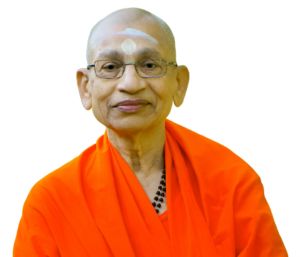
Spiritual Discourses: Īśvara is both the maker and the material
By Swami Viditatmananda Saraswati*
Na Me Bhaktaḥ Praṇaśyati – 05
Īśvara is both the maker and the material. Īśvara pervades everything. He is very much in our life all the time. From that standpoint, we call īśvara the creator of the universe, sustainer of the universe, and resolver of the universe. For creation, you require two causes, which we call the material cause and the intelligent or efficient cause. To make a pot, we require two things—one is the clay and the other is the pot maker. Clay is material, so it is called the material cause. The pot maker is the maker, so it is called the efficient cause.
We require both material and a maker to create anything. For cloth, we need cotton as well as a weaver. For a table, we need wood as well as a carpenter. For ornaments of gold, we need gold as well as a goldsmith. For a shirt, we require clothes as well as a tailor. The maker and material are both necessary.
Our common experience in day-to-day life is that the maker is different from the material. For example, the pot maker is different from the clay pot. It is also good that the pot maker is different from the pot, otherwise, it would be difficult to live life. If the pot maker came along with the pot and the tailor came with the shirt, and so on, you would have a pot maker, tailor, weaver, carpenter, and all kinds of makers in your home with you. But they are not in your home because the maker is different from the material.
Other traditions apply the same model to the universe. Observing in the world that the maker is different from the material, they conclude that God, the maker, is different from the universe he creates. They say that God created the world but is separate from it. Then, where is he? Since you do not see īśvara anywhere here, he must be someplace in heaven.
According to these traditions, just as the pot maker transcends the pot and is unaffected by the pot, similarly īśvara transcends creation; he is the transcendent reality. The pot has name and form and the creation has name and form, but īśvara, who is unconnected with the creation, has no name and no form. He is formless.
This is where Vedanta is different from other traditions. Vedanta says that when it comes to the creation of the universe, the material is not different from the maker, meaning that God includes the material. In the case of the universe, the creation is not apart from the creator. Therefore, God is present in everything. He is the creator, sustainer, and resolver.
When Lord Krishna says “I,” he means īśvara, and we should understand it to mean that he is both the maker and the material. He says, mattaḥ parataraṁ nānyat kiñcidasti, do not think that the material is different from me. I am both the maker as well as the material. All there is, is myself alone.
One limitless self, īśvara, is all there is
If the creation were separate from the creator, the creator would have to be somewhere else, up there in heaven, pulling strings and controlling life. This conclusion raises questions in the minds of people. Why did he make one fellow poor and another fellow rich? Why is this person a murderer and why is this other person the murdered? Why should God create all this disparity and injustice? We become upset with God because we see so much that seems unfair.
But Vedanta says that the maker and material are one; the creator and created are not different from each other. All there is, is God, meaning that the one who murders is God and the one who is murdered is also God. This can be the case only when this is a play, only when one has taken the role of both the murderer and the murdered, when both of these are only roles and not the ultimate reality. The roles are mithyā, not real. He is the self of all, which means that if he is in a criminal and shoots somebody, he is shooting himself.
If I lightly slap my cheeks, you might think I am hurting myself, but I am just playing with myself. If I do this to you, it is called hitting, but doing this to myself is called playing. Whatever I do to myself is called play.
The point is that, if īśvara manifests as all this, including the one who robs and the one who is robbed, then both of them are one alone. Imagine a movie in which one actor is playing a double role—the role of a thief and the role of a wealthy person. He steals from himself because the same fellow is playing both roles. Vedanta explains that it is one īśvara alone who manifests in all names and forms. He alone plays all the roles and therefore it is just a play; don’t take it too seriously.
This is the thinking of the wise people. When the freedom struggle was going on in India, Mahatma Gandhi once sent a representative to Ramana Maharshi, who was well-known as a wise person and a sage. Gandhiji thought that if someone like that joined the freedom struggle, it would bring great motivation to people, so he sent an emissary to seek the support of the sage. Ramana Maharshi replied to the representative, “Ask Gandhiji this question: ‘When watching a movie and seeing a fire in the movie, would you call a fire engine?’ Freedom is mithyā and this struggle is also mithyā. That is the ultimate reality.”
Hearing the reply, Gandhiji did not feel bad at all; he understood that this was the standpoint of the wise person.
The ultimate reality is that a sinner is a sinner at a certain level, but at the core, he is also the one limitless self, īśvara. A saint is a saint at the level of appearance, but at the core level, he is also the same limitless self. Therefore, everybody can ultimately become a devotee of īśvara and everybody can attain the ultimate goal of freedom from limitation.
Begin with Conviction to Know Īśvara
Anyone can become a devotee
In the Bhagavad Gita, Lord Krishna says:
api cetsudurācāro bhajate mām ananyabhāk
sādhureva sa mantavyaḥ samyagvyavasito hi saḥ (9.30)
Even if someone of highly improper conduct worships me with one-pointed devotion, he is to be considered a good person because he has resolved rightly. (9.30)
Ācāra means conduct, durācāra means bad conduct, and sudurācāra means the most evil conduct. Suppose there is somebody who is the greatest sinner, who has violated all the norms of society and who has committed many great sins. He is sudurācāra. Even that one, who everybody thinks is a sinner, bhajate mām ananyabhāk, if he worships me with one-pointed devotion; sādhureva sa mantavyaḥ, you should know that he is a saint because his resolve has changed.
In the core, everybody—a sinner, a saint, a criminal, or whoever it is—is the same divine being. That is why anyone can become a devotee and has an opportunity to reach the goal.
A bandit became Vālmīki, the great sage
In the Purāṇas, there are many stories of sinners becoming saints. One such is the well-known story of Sage Vālmīki. Born a brāhmaṇa, he had been abandoned by his parents as a child and found by thieves, who raised him. They taught him to be a bandit, who robbed anyone who passed through the forest where he lived. He would attack and even kill anyone who did not cooperate.
One day, this bandit robbed a great sage who was passing by. After handing over his kamaṇḍalu and rudrākṣa-mālā, the sage asked him, “Why are you doing this? You know that you are doing wrong by robbing and killing people. You are gathering a lot of pāpa-karma, sins.” The robber replied, “I know it, but this is the only life I know. I am doing it for my family.” The sage asked, “Your family shares all the spoils of your exploits, but will they share your sin also?” The robber replied that of course, they would. The sage inquired whether the bandit had ever verified this with them. He had not.
The robber went home to his wife and asked if she knew that he was making money by committing crimes. She confirmed that she knew. He asked if she enjoyed the fruits of those crimes. “Yes, of course, we all do,” she replied. Finally, he asked, “Since you are partaking of what I have earned, then you will surely share half of my sins. Isn’t that correct?” His wife said, “No, I share your money alright, but not your sin.” Then the robber asked his children the same questions and received the same replies. Nobody was willing to share his sins.
The robber was disillusioned. He went back to the sage, knelt before him, and begged, “I was doing wrong. Please, take back your kamaṇḍalu and rudrākṣa-mālā. Tell me what I should do to overcome this sin.” The sage instructed him to constantly chant the name “Rāma Rāma Rāma.” By sitting under a tree repeating the mantra with devotion and conviction for a long time, this robber purified his mind and eventually became the eminent sage that we know as Sage Vālmīki.
You require correct conviction about the goal
A sinner can become a sage only if he is not a sinner to the core. What is superficial can go away but what is inherent cannot go. If you take a piece of sandalwood, whose nature it is to be fragrant and leave it in water for some time, the outer surface rots and starts to stink. If you remove the sandalwood from the water and rub off the outer layer, the stink disappears and the fragrance returns. The nature of the wood has not changed; the rot is superficial. Had the stink been the nature of the wood, it could never go. You can rub another type of wood, like acacia as much as you want, but no fragrance will come because fragrance is not the acacia wood’s nature. The fragrance comes from sandalwood because that is its nature.
Similarly, what we call criminals, thieves, or sinners are superficial, nothing but the outer surface. If it were one’s nature, it would never go. In the core, each one of us is the fragrant, limitless self. Therefore, Lord Krishna says that however great a sinner one is, if he decides to change, then he can attain the same goal as anybody else. It is the privilege of everybody because limitlessness is the nature of everybody. That is a great saving grace. If limitlessness were not one’s essential nature, then nobody could attain the goal of limitlessness, just as it is impossible to obtain fragrance from wood that is not essentially fragrant.
What transforms a sinner like a bandit into a saint such as Vālmīki is simply a determination in his mind that, “I want to change.” Lord Krishna says samyagvyavasitō hi saḥ, when the right conviction has happened, then the person has undergone a transformation. Vyavasāya means a conviction or a determination. All that is necessary for any one of us is samyagvyavasāya, the right conviction as to what I want to become, what I want as my goal, and what is most important to me.
I am a devotee by nature. I become a devotee of whatever is the most important to me. As long as wealth is most important to me, I am a devotee of wealth. If power is the most important to me, I become a devotee of power. Every desire shows devotion to the limitless because that is the only desire in all other desires. If īśvara becomes the most important to me at any time, then I become the devotee of īśvara, because I am already a devotee. It is only the locus of devotion that is different. All that needs to happen is to change the locus of devotion.
-to be continued…
*Swami Viditatmananda Saraswati has been teaching Vedānta Prasthānatrayī and Prakaraṇagranthas for the last 40 years in Ahmedabad, Gujarat. Throughout the year, he conducts daily Vedānta discourses, accompanied by retreats, and Jñāna Yajñas on Vedānta in different cities in India and foreign countries.







I M attending Swami,s pravachans whenever he is in Mumbai. AT PRESENT I m listening Bhrhmsutrs online